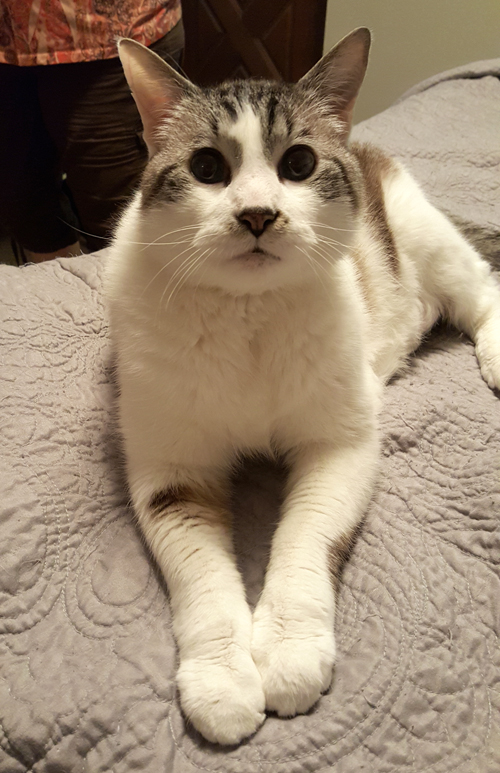I’m a dedicated, hardcore eBook reader. Back in 2009, my wife picked up a bulky, strange reading device: the Kindle 2. This was only about a year and a half after the launch of the first iPhone, so full touch-screen devices still hadn’t quite taken over. The Kindle 2 was big for its screen size, with giant bezels and a strange integrated keyboard and d-pad used for navigation and searching. It was goofy-looking, and a little awkward to use.
After reading on it for ten minutes, I was hooked. See, I’d tried to read eBooks in the past, primarily on a computer, and never connected with them. The experience was jarringly different, until someone took the time and energy to design a digital book experience specifically for readers.
Not long after, both of us upgraded to the Kindle 3, a slightly less awkward – but still tied to legacy features like a physical keyboard – device, and we never looked back. Within a year we had begun the process of replacing all our books with eBooks and had sold our entire, substantial physical library.
I’d like to talk to you about the glory of eReaders, and why I think they get an undeserved bad rap from parts of the reading community.
Let me start this off by saying I’m not going to discuss the more ephemeral joys of reading physical books. There is a significant segment of the reading population who thoroughly enjoy the feel, the look, and even the smell of tree-books. For many, having a personal library of books they can display on shelves is just as important as the reading experience itself.
I do not, in any way, begrudge these folks. I’m not here to argue that one way is “better” than the other, or to tell you that eReaders are an objectively superior choice. I think the “eBook vs Tree Book” debate/rivalry/war/whatever is absurd. These aren’t two sides of a conflict; rather they’re two sides of the same coin.
We’re all readers.
I could wax rhapsodic about why I love my eReader. It’s light and ergonomic. I can read in almost any conditions. It’s water resistant. I can easily read it one handed. I have over 1,500 books with me wherever I go, and I never have to pick-and-choose which ones I take on vacation or out of the house. I no longer have to worry about shelf space. I never have pack and lift boxes of books when I move. The list goes on.
In specific, though, I want to address a physical complaint I frequently see in these discussions, and the misconception fueling it.
I can’t count the number of times I’ve seen readers deride eBooks in favor of physical with the specific complaints that they can’t concentrate when reading eBooks, or that reading eBooks hurts their eyes or gives them headaches, or that they can’t read for long sessions. In many of these instances, it’s made clear that the person lodging these complaints has never used an eInk device, and has only read eBooks on a phone, tablet, or computer screen.
eInk screens – like what you’ll find on Kindle, Kobo, and older Nook devices (as well as a ton of others now, like the reMarkable) are a completely different beast from your typical LCD/LED screen, and are built specifically with readers in mind.
A lot of digital ink has been dropped about the problems with staring at screens all day. Google “Computer Vision Syndrome” or “Blue Light Exposure”, and you’ll run across endless articles about the problems we all face in a world run by screens. While looking at screens for extended periods isn’t likely to cause any lasting damage, things like eye strain, headaches, and blue light exposure are all very real issues.
But, for the most part, they don’t apply to eInk screens, for two main reasons: eInk screens are not backlit, and they don’t constantly refresh.
First and foremost, eInk screens – even the ones with built-in lights – are not backlit. While staring at any brightly-lit screen for hours on end – even with external lights – might cause issues, backlit screens beaming light directly into your eyeholes has been proven a major cause of eye-strain and headaches.
eInk screens, however, are opaque, and thus are impossible to backlight. The misconception of backlit eInk screens is constantly reinforced by articles and reviews where the authors casually use the word “backlit” even though it’s incorrect. eInk manufacturers designed a clever type of front-light for modern eInk devices where a layer is placed over the top of the eInk screen that redirects lights from the edge of the device down onto the page to light it while still being transparent for reading. This is the type of light you’ll find on almost every newer eReader like the Kindle Paperwhite/Oasis or the Kobo Aura.
But if you find the front lights on devices like this still hurt your eyes, you can turn the lights off, and still read. Early eReaders didn’t even have built-in lights, so you’d light them just like you would a book – with room light or a clip light. Some of the less-expensive models still don’t have built-in lights. eInk was designed to be digital paper (some early devices actually called it “ePaper”), readable just like you’d read a paper page.
Part of delivering this feature was designing a screen that didn’t need to be constantly refreshed. Unlike LCD screens that are refreshing anywhere from 30 to 240 times per second (another potential source of eye strain), eInk screens only refresh when they’re changed. So, if you have a static page of text, it’s just that: static. The individual pixels are locked into a particular configuration – displaying a book page, for example – without the need to consume power to maintain it. So, when you turn the page on an eBook, the eInk screen draws a minuscule amount of battery power to rearrange the pixels on screen, then goes dormant. This is one of the reasons why eInk devices have such amazing battery life.
And to make sure I address an earlier point: Blue light exposure can still be an issue. Until recently, the LED side-lights on eReaders were still well into the cool end of the spectrum, and could result in the same circadian-rhythm-altering issues as other screens. Newer eInk devices have started integrating warm light features, though, so you can adjust the amount of blue light coming off your screen (my Kindle Oasis does this, for example, and it’s phenomenal). And you can still always use an external light.
What this all boils down to is that modern eInk screens – the ones you find on dedicated eInk devices – are no different than reading a physical book page. They’re static, non-backlit, non-refreshing displays, specifically designed not to cause the same types of eye strain as your average phone or computer screen. It’s as far from reading on a phone screen as a physical book is.
So, if eye strain, headaches, or inability to concentrate are reasons you’ve given up on eBooks in the past, but you’ve only ever tried eBooks on your phone, tablet, or monitor, give a dedicated eReader a try. They combine all the benefits of physical books (except smell, of course) with all the convenience of a modern device. You might be surprised at how great the digital reading experience can be when it’s supported by the right hardware.



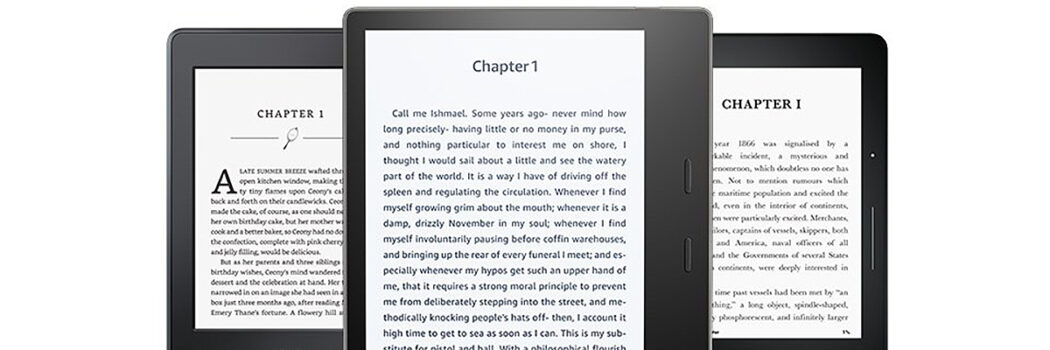
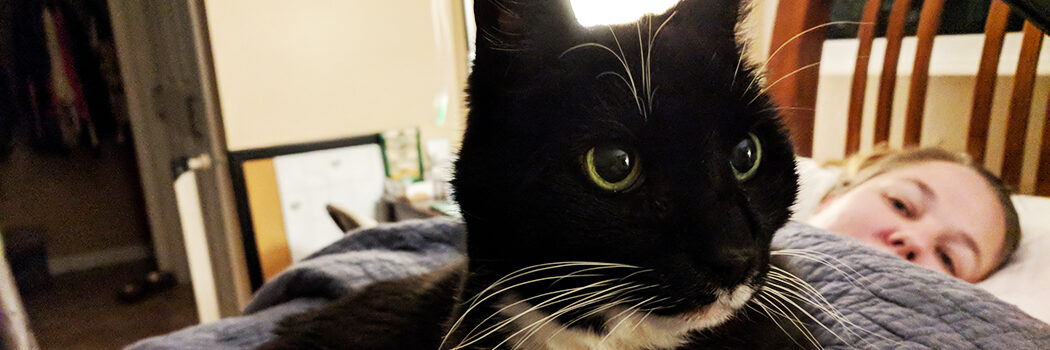
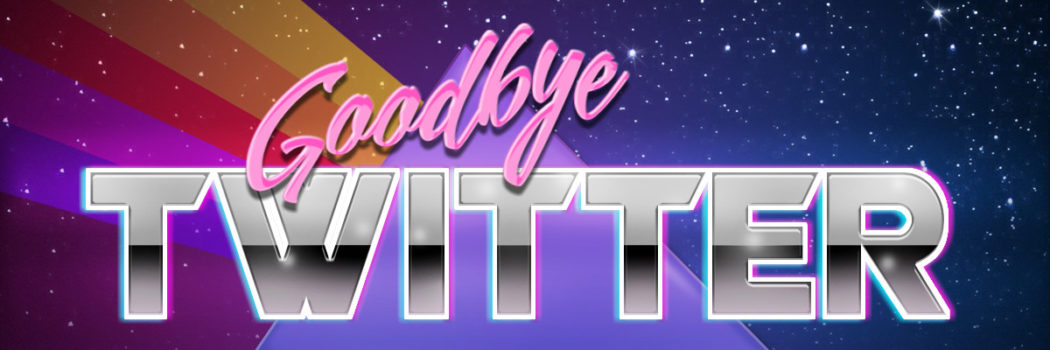
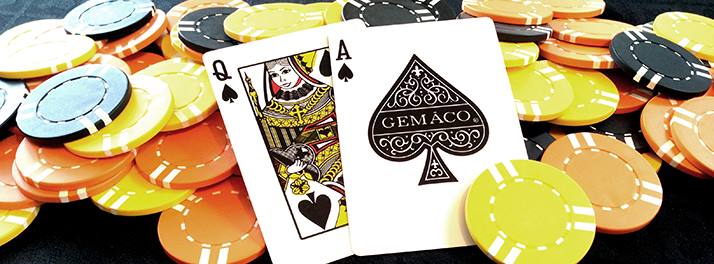
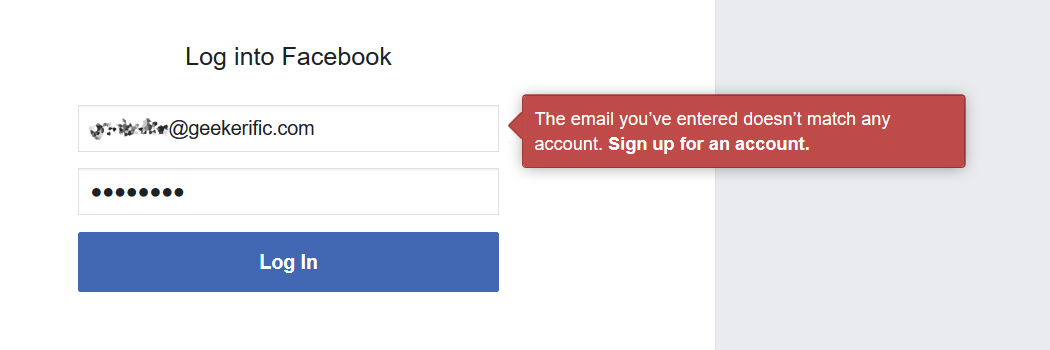
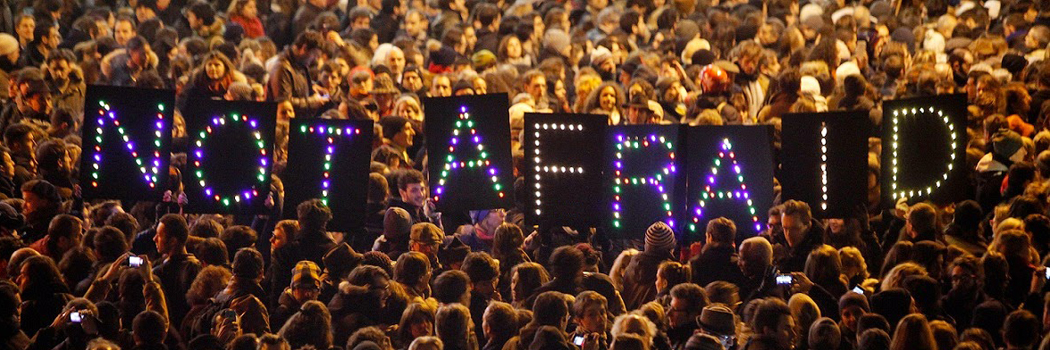
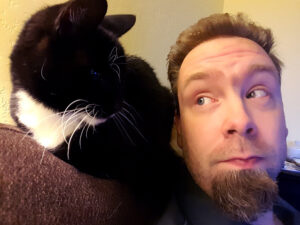 Sometimes it feels like the only reason I come back to this blog is to write about massive changes or terrible things happening in my life. But I want to document some of these things as a means of remembrance, especially when it comes to my pets. Losing Midnight last month was, for us, the marking of an era.
Sometimes it feels like the only reason I come back to this blog is to write about massive changes or terrible things happening in my life. But I want to document some of these things as a means of remembrance, especially when it comes to my pets. Losing Midnight last month was, for us, the marking of an era.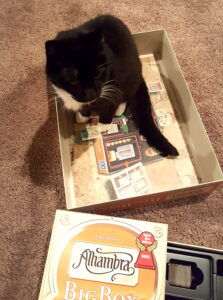 In Midnight’s case her disease moved much slower, and was more treatable in the long term. Bastion passed away only about six months after his diagnosis. Midnight stayed with us for almost three years. It involved a lot of work: subcutaneous fluids every day (which involves inserting an IV needle under her skin and dripping 100ml of saline solution into her system), prescription food, and four different medications, delivered by pill and shot. It was a lot of work. Work I’d do every single day for the rest of my life if it meant Midnight would still be with us. And without that work, she definitely would’ve died much sooner.
In Midnight’s case her disease moved much slower, and was more treatable in the long term. Bastion passed away only about six months after his diagnosis. Midnight stayed with us for almost three years. It involved a lot of work: subcutaneous fluids every day (which involves inserting an IV needle under her skin and dripping 100ml of saline solution into her system), prescription food, and four different medications, delivered by pill and shot. It was a lot of work. Work I’d do every single day for the rest of my life if it meant Midnight would still be with us. And without that work, she definitely would’ve died much sooner.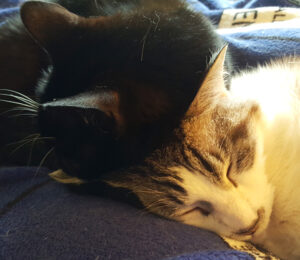 After Gremlin and Bastion passed, we knew for sure where she had been directing her affection, because it all came to us. Through both of their illnesses, she was their caretaker, frequently cleaning them and cuddling with them when they weren’t feeling well. When they were gone, it was clear she was lonely. She realized she didn’t need to be, and finally started showing us the kind of affection she’d always shown them. She became almost needy, and it was both heartwarming and bittersweet.
After Gremlin and Bastion passed, we knew for sure where she had been directing her affection, because it all came to us. Through both of their illnesses, she was their caretaker, frequently cleaning them and cuddling with them when they weren’t feeling well. When they were gone, it was clear she was lonely. She realized she didn’t need to be, and finally started showing us the kind of affection she’d always shown them. She became almost needy, and it was both heartwarming and bittersweet.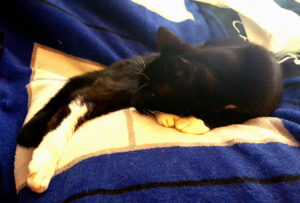 Gremlin, Bastion, and Midnight were our first pets. They were a unit. The genesis of our family. In total, the three of them were with us for almost two decades. Each one of their deaths has had a massive impact on us, and the three of them all being gone now feels like the end of an era. I know life goes on and new eras will come and go, but figuring out a new dynamic was a challenge – in spite of knowing it would someday come – I never really prepared myself for.
Gremlin, Bastion, and Midnight were our first pets. They were a unit. The genesis of our family. In total, the three of them were with us for almost two decades. Each one of their deaths has had a massive impact on us, and the three of them all being gone now feels like the end of an era. I know life goes on and new eras will come and go, but figuring out a new dynamic was a challenge – in spite of knowing it would someday come – I never really prepared myself for.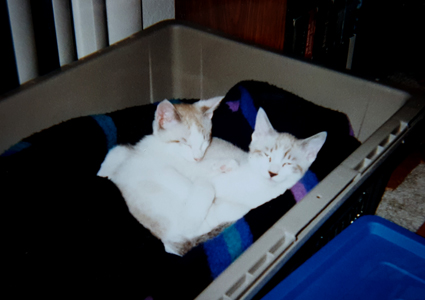 We picked up Gremlin and Bastion in 1999, during our first anniversary. For the first several years of our marriage, we traveled to Victoria, BC for vacation. Normally, we’d drive to Port Angeles, WA to catch the ferry, but this time our trip was slightly delayed. We missed the last boat out by literally minutes, stranding us in Port Angeles overnight.
We picked up Gremlin and Bastion in 1999, during our first anniversary. For the first several years of our marriage, we traveled to Victoria, BC for vacation. Normally, we’d drive to Port Angeles, WA to catch the ferry, but this time our trip was slightly delayed. We missed the last boat out by literally minutes, stranding us in Port Angeles overnight.  We asked to see them, each picked one up, and they sunk their hooks into our hearts the moment we touched them. Christina immediately knew Bastion was “hers”, and I felt the same way about Gremlin (even though we didn’t have names for them yet). We even traded holding each of them several times, just to be absolutely sure which ones we were attached to, and from that first moment on those attachments never faded or changed. The problem was that we were about to go on a week-long vacation, and couldn’t take them with. So, we paid for them (only $10 each!) and left them in the pet store to pick up on our way home.
We asked to see them, each picked one up, and they sunk their hooks into our hearts the moment we touched them. Christina immediately knew Bastion was “hers”, and I felt the same way about Gremlin (even though we didn’t have names for them yet). We even traded holding each of them several times, just to be absolutely sure which ones we were attached to, and from that first moment on those attachments never faded or changed. The problem was that we were about to go on a week-long vacation, and couldn’t take them with. So, we paid for them (only $10 each!) and left them in the pet store to pick up on our way home. 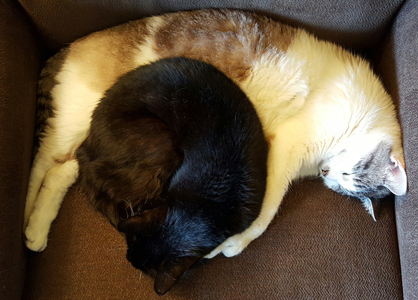 He accepted Midnight into the family without even a thought. Their adjustment period was only hours, and they curled up with each other the first night they were able. Gremlin was like our family’s animal ambassador. Although he was initially very wary of Colt (which, combined with Midnight’s hostility and Bastion’s aloofness, made Colt very gun-shy of cats), he was the only cat to ever try to actively befriend Colt. He’d approach Colt for attention, try to play with him, and even walk back and forth under Colt’s midsection to try and make nice. Even though Colt was scared and not having any of it, Gremlin continued to try. I even got them to lay on the same bed a few times, without too much coaxing.
He accepted Midnight into the family without even a thought. Their adjustment period was only hours, and they curled up with each other the first night they were able. Gremlin was like our family’s animal ambassador. Although he was initially very wary of Colt (which, combined with Midnight’s hostility and Bastion’s aloofness, made Colt very gun-shy of cats), he was the only cat to ever try to actively befriend Colt. He’d approach Colt for attention, try to play with him, and even walk back and forth under Colt’s midsection to try and make nice. Even though Colt was scared and not having any of it, Gremlin continued to try. I even got them to lay on the same bed a few times, without too much coaxing.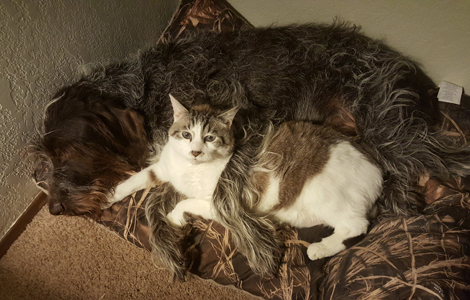 In my life, I’ve had well over 10 cats, starting from when I was very young. I can say, definitively, Gremlin was the best of them. He was affectionate, but not needy. Confident, but not aloof. Playful, but not manic. He was the most cuddly, warm, loving cat I’ve ever had the privilege of caring for. He loved unconditionally, and was unconditionally loved. He’s irreplaceable, and that’s the hardest part for me.
In my life, I’ve had well over 10 cats, starting from when I was very young. I can say, definitively, Gremlin was the best of them. He was affectionate, but not needy. Confident, but not aloof. Playful, but not manic. He was the most cuddly, warm, loving cat I’ve ever had the privilege of caring for. He loved unconditionally, and was unconditionally loved. He’s irreplaceable, and that’s the hardest part for me.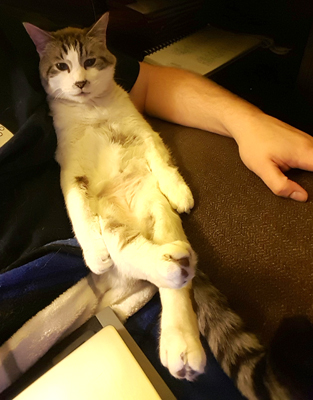 There was something specifically comforting about Gremlin’s attention. It never felt like he was demanding attention from you… instead it was like he was paying attention to you. It’s a feeling that’s almost impossible for me to articulate, because it felt so special. So human. I’ve never in my life had a bond with an animal as strong as what I had with Gremlin. Without him, the world is a much harder place to deal with, to accept. He was with me for my entire adult life. Losing him, for me, is like losing a piece of myself.
There was something specifically comforting about Gremlin’s attention. It never felt like he was demanding attention from you… instead it was like he was paying attention to you. It’s a feeling that’s almost impossible for me to articulate, because it felt so special. So human. I’ve never in my life had a bond with an animal as strong as what I had with Gremlin. Without him, the world is a much harder place to deal with, to accept. He was with me for my entire adult life. Losing him, for me, is like losing a piece of myself. 